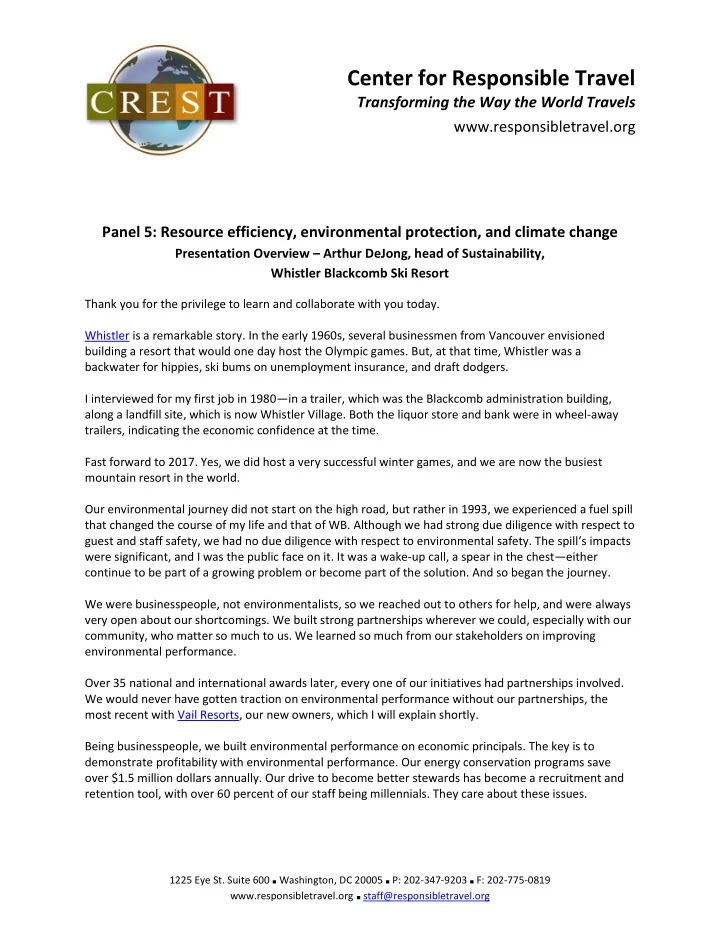

Center for Responsible Travel Transforming the Way the World Travels www.responsibletravel.org Panel 5: Resource efficiency, environmental protection, and climate change Presentation Overview – Arthur DeJong, head of Sustainability, Whistler Blackcomb Ski Resort Thank you for the privilege to learn and collaborate with you today. Whistler is a remarkable story. In the early 1960s, several businessmen from Vancouver envisioned building a resort that would one day host the Olympic games. But, at that time, Whistler was a backwater for hippies, ski bums on unemployment insurance, and draft dodgers. I interviewed for my first job in 1980 — in a trailer, which was the Blackcomb administration building, along a landfill site, which is now Whistler Village. Both the liquor store and bank were in wheel-away trailers, indicating the economic confidence at the time. Fast forward to 2017. Yes, we did host a very successful winter games, and we are now the busiest mountain resort in the world. Our environmental journey did not start on the high road, but rather in 1993, we experienced a fuel spill that changed the course of my life and that of WB. Although we had strong due diligence with respect to guest and staff safety, we had no due diligence with respect to environmental safety. The spill ’ s impacts were significant, and I was the public face on it. It was a wake-up call, a spear in the chest — either continue to be part of a growing problem or become part of the solution. And so began the journey. We were businesspeople, not environmentalists, so we reached out to others for help, and were always very open about our shortcomings. We built strong partnerships wherever we could, especially with our community, who matter so much to us. We learned so much from our stakeholders on improving environmental performance. Over 35 national and international awards later, every one of our initiatives had partnerships involved. We would never have gotten traction on environmental performance without our partnerships, the most recent with Vail Resorts, our new owners, which I will explain shortly. Being businesspeople, we built environmental performance on economic principals. The key is to demonstrate profitability with environmental performance. Our energy conservation programs save over $1.5 million dollars annually. Our drive to become better stewards has become a recruitment and retention tool, with over 60 percent of our staff being millennials. They care about these issues. 1225 Eye St. Suite 600 ■ Washington, DC 20005 ■ P: 202-347-9203 ■ F: 202-775-0819 www.responsibletravel.org ■ staff@responsibletravel.org
Our social license to grow our business is strongly based on environmental performance. During our last major expansion, which started controversially, we reduced a 40 percent development footprint to 5 percent. The lesson we learned was to build recreational experiences inside ecosystems, not try to change those systems. Then there’s s ocial sustainability. The Whistler Blackcomb Foundation has raised over $9 million dollars, which provides financial support for non-profit organizations that benefit local residents in the areas of health, human services, education, recreation, arts and culture and the environment with an emphasis on youth and family programs. Now let me talk about climate change, as the ski industry is often referred to as the “ canary in the coal mine. ” Climate change is such an overwhelming, macro, global problem — how do you break it down at the micro level? Locally, our glaciers are shrinking at an alarming rate. And the elephant in this room is the environmental impact of long-haul travel. That’s something we all need to address. But what are we doing at the local level? Thanks to a micro-hydro renewable energy system, we produce what we consume in electricity. Whistler Blackcomb also has reduced its waste to the landfill by 71 percent. And with our new partner, Vail, we’ve made what we’re calling an “ Epic Promise ,” committing to zero net emissions, zero waste to landfill, and zero net operating impact to forests and habitat by 2030. Here is an overview of Whistler Blackcomb's Climate Change Strategy Framework:
We need to get this done, because we are running out of time. And Whistler’s not just a ski resort. We’re open all four seasons, offering nature-based tourism with activities like mountain biking, hiking and Alpine walks. But the reality is, Whistler is a teaspoon on the Titanic. We need to inspire others. Vail ’s purchase of WB, and making this “Epic Promise,” could not be more timely. With 14 resorts, whenever Vail raises the bar, the industry bar is raised. We need to use this leverage and also influence all sectors of global tourism. We need to punch above our weight.
Recommend
More recommend